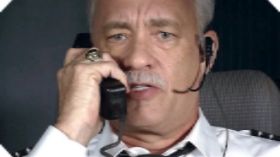 All too often, the term “ripped from the headlines” portends a tale that is either tragic or difficult to comprehend…or both. It is rare to see a reality-based story that has a happy ending, so, when we do, we need it to offer some sort of catharsis, and, most of all, hope.
All too often, the term “ripped from the headlines” portends a tale that is either tragic or difficult to comprehend…or both. It is rare to see a reality-based story that has a happy ending, so, when we do, we need it to offer some sort of catharsis, and, most of all, hope.
Ask me if I can imagine any other director than Clint Eastwood to direct Sully, the true story of Captain Chesley Sullenberger’s January, 2009 heroic handling of an US Airways jet that loses both its engines just after takeoff, and I would have said Eastwood was the perfect one to bring us this post-9/11 fairy tale to our screens. As a director, Eastwood is dependable, efficient, excellent and basic. Not at all unlike Sullenberger or his story. But here is where the conundrum of this movie lies: if it seems like Eastwood and Sullenberger are cut from the same cloth, can Eastwood really tell an honest and cathartic story that would be truthful, illuminating AND entertaining? I’m not saying he couldn’t, but, as it turns out, he didn’t.
Sullenberger’s story—or, as the rest of the world now know him, Sully—is certainly one worthy of the big screen. Unfortunately, the movie I saw on Friday night just didn’t feel up to the myth or the potential that I had hoped for. Eastwood and writer Todd Komarnicki (based on Sullenberger’s book) deliver a thoroughly professional point-by-point re-telling of one of the greatest moments in aviation history, but, sadly, there just doesn’t seem to be much else there. You get the story, just with no feeling.
Sully certainly had one great thing going for it from the get-go (besides an Academy Award winning director at the helm), and that was casting Tom Hanks as Sully. Hanks is also utterly reliable and forthright in his performances, and he is in classic post-Forrest form here, serious and thoughtful, stately and respectable, empathetic and warm. But the problem is, he’s also totally wasted. Eastwood chooses to color this movie as little as possible, and that includes Hanks’s performance, which feels as monotone as a robotic Vin Diesel. The main thrust of Sully as a screenplay isn’t a re-creation of the events of that day in January, 2009, it is instead the government’s investigation of Sullenberger’s handling of the incident. This means we spend most of the movie either in conference rooms with people sitting around a table talking technical jargon, or, worse yet, long, drawn-out scenes of Sully looking glum. He wakes up glum, he eats glum, he even runs glum. The whole “woe is me” thing runs its course pretty quickly, but the navel gazing never stops. Until, that is, the movie abruptly stops and you’re left wondering, “that’s it?”
And that’s the thing about this movie. Going in, I was truly interested in two things about this story: how did the “miracle on the Hudson” actually happen and why has this hero—the guy who we ALL want flying our plane—has never flown again. I got no answer at all to the second question, and, as for the first, Eastwood does shoot quite a compelling “crash” sequence, but—intentionally, I’m sure—it has all the flair and drama of a mosquito bite. Now, I certainly wasn’t hoping for another Flight sequence (I’m not sure I’ll ever get over that one), but a little more would have been nice. This is the moment we came to see, these are the moments we want to live through. This had a HAPPY ENDING and I really felt like we were denied the emotions and catharsis of that. Instead of spending time with the actual flight and its immediate aftermath and repercussions (a deeper look to the many people who helped rescue the passengers, the flight attendants, the after-effects to both Sully and the crew, for example), Sully bogs down in navel gazing and boardroom melodrama.
I’m not saying Sully is a bad movie. Like all Eastwood movies, it’s totally professional, well made and accessible. But it’s also colorless and, surprisingly, heartless. It ends just when we are wondering when it’s going to get started. That could be a good thing, but, in this case, Sully is overly staid and flat. I’m not asking for an over-the-top Roland Emmerich-type movie, but somewhere between the pompous braggadocio of Peter Berg and the solemn understated monotone of Eastwood there could have been a movie that gave us Sully and the tale of Us Airways Flight 1549 in a much more compelling—and heartwarmingly entertaining—way.
